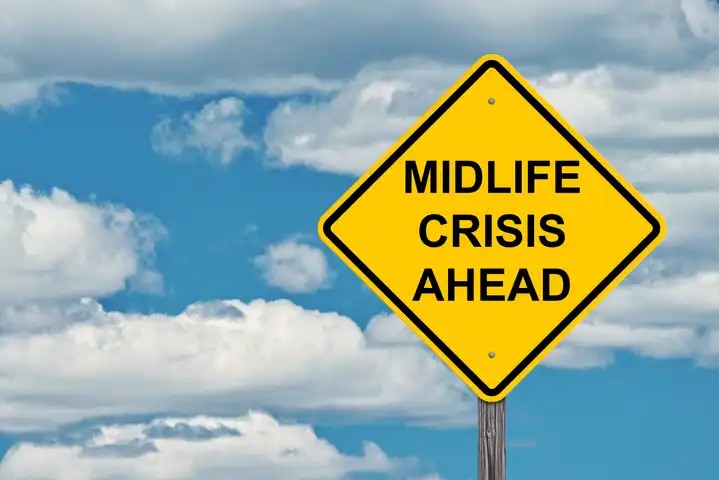Many people face the tough challenges of a midlife crisis, which can sadly lead to divorce. About 50% of marriages in the U.S. end in divorce, with midlife crises often playing a role. It’s heartbreaking to see how a midlife crisis can hurt relationships. Seeking help is key to overcoming this crisis and avoiding a divorce.
Since the 1990s, the divorce rate for those aged 40-50 has doubled. This shows the need for support during this critical time. Around 25% of men and women say a midlife crisis hurt their relationships. It’s important to recognize the signs and get help to avoid a divorce.

A midlife crisis can be tough and emotional, causing restlessness and dissatisfaction in relationships. Almost 60% of those who went through a midlife crisis felt restless and dissatisfied in their relationship. It’s crucial to tackle these feelings and work on resolving issues to avoid a divorce.
Key Takeaways
- A midlife crisis can lead to a middle life crisis divorce, with approximately 50% of marriages in the United States ending in divorce.
- Seeking help and support from professionals, support groups, and loved ones is crucial in navigating a midlife crisis and preventing a divorce.
- Recognizing the signs and symptoms of a midlife crisis, such as feelings of restlessness and dissatisfaction in a relationship, is essential in addressing the issue and preventing a middle life crisis divorce.
- Communication breakdowns in relationships are prevalent, with up to 50% of couples reporting decreased communication at midlife, highlighting the need for effective communication to prevent a divorce.
- Around 70% of middle-aged individuals seek counseling during a midlife crisis, with those attending couple’s therapy showing a higher success rate in overcoming relationship issues and preventing a middle life crisis divorce.
Understanding the Connection Between Midlife Crisis and Divorce
Midlife crises can deeply affect relationships, sometimes leading to divorce. It’s key to know the signs and how they impact relationships. Hormonal shifts, especially during pre-menopause and menopause, can trigger these crises. They can also affect mental health and overall well-being.
Common signs of a midlife crisis include acting impulsively, feeling isolated, and feeling overwhelmed. To cope, focusing on self-care is crucial. This means seeking help, building a support network, and practicing self-care to improve mental health.
Understanding the link between midlife crisis and divorce helps protect relationships and mental health. It’s important to talk openly, consider counseling, and find healthy ways to deal with stress and anxiety.
Make a table below
| Trigger | Warning Sign | Coping Strategy |
| Hormonal changes | Impulsivity | Seek professional help |
| Pre-menopause and menopause | Feelings of isolation | Build a support network |
| Responsibility overload | Sense of burnout | Engage in self-care practices |
Navigating Your Middle Life Crisis During Divorce
Going through a midlife crisis can be tough, especially when you’re getting a divorce. It’s key to take care of yourself and get support from family, support groups, and therapy. These places offer a safe space to talk about your feelings and worries, helping you deal with big changes in your life.
A midlife crisis can be a chance to rethink your life, goals, and relationships. But it can also feel scary and uncertain. Getting help and joining support groups can help you understand your feelings better and find ways to handle stress and doubt.
Some good things about getting help during a midlife crisis include:
- Improved emotional well-being
- Enhanced relationships with loved ones
- Increased self-awareness and personal growth
- Effective coping strategies for managing stress and anxiety
By recognizing the value of therapy and support groups during a midlife crisis, you’re taking a big step towards healing and growth. Remember, dealing with a midlife crisis during a divorce takes time, care for yourself, and a readiness to ask for help when you need it.
| Benefits of Seeking Help | Description |
| Emotional Well-being | Improved mental health and reduced stress |
| Personal Growth | Increased self-awareness and self-acceptance |
| Relationships | Enhanced relationships with loved ones and improved communication |
Essential Coping Strategies for Life Transitions
Managing emotions is key during these times. Life events like divorce add to the stress, especially with 40-50% of marriages ending in divorce in the U.S.
Professional Support Options
Getting help from a therapist can really help, with 80% of people feeling better after a breakup. Talking to friends and family can also lower stress by 50%.
Building Your Support Network
Having a strong support network is crucial. Losing friends after a breakup affects 50% of people. Helping others through volunteer work can boost your mood and social connections by 50%.
Self-Care Practices That Actually Work
Practices like journaling can help 70% of people feel less anxious after a breakup. Keeping a daily routine can also help, with 65% saying it improves their mood.
Rebuilding Your Identity After Major Life Changes
After a middle life crisis divorce, many people feel a big change in their hormones. This can mess with their mood and how they see themselves. It’s key to know that getting back to who you are takes time and work.
About 75% of people going through a divorce say they feel really down. But, with the right help and taking care of yourself, you can get through this tough time. Here are some ways to start rebuilding your identity:
- Rediscovering personal interests and goals
- Creating new social connections
- Achieving financial independence
By working on these areas, you can start to find your purpose again. It’s also important to understand how hormones affect your feelings. If you need help, don’t hesitate to ask for it.
Remember, finding your way again after big changes is a journey. It’s okay to take your time. With patience, self-care, and the right support, you can come out of this with a new sense of purpose and a stronger sense of self.
Conclusion: Moving Forward with Confidence and Purpose
Going through a midlife crisis and divorce can be tough and emotional. Yet, it can also be a time of great growth. By getting professional help and finding new ways to cope, you can come out stronger and more focused.
A midlife crisis or divorce is not the end. It’s a chance to rethink what’s important, explore new interests, and find a more meaningful path. With the right support and a desire to grow, you can face the future with hope and determination.
You’re not alone in this journey. Many have gone through similar experiences and found their way. There are resources and communities ready to help and support you. By taking care of yourself, making new connections, and setting new goals, you can overcome this challenge.
In the end, the struggles of a midlife crisis or divorce can lead to a remarkable change. With bravery, kindness to yourself, and a focus on your well-being, you can start a new chapter of your life with confidence and excitement.
FAQ
What is a midlife crisis, and how is it connected to divorce?
A midlife crisis is a time of emotional turmoil in middle age, often between 40 to 60. People may question their purpose and life choices, feeling uncertain and unsatisfied. This can lead to a desire for change, including ending a marriage.
How do hormonal changes influence decision-making during a midlife crisis?
Hormonal changes, especially in pre-menopause and menopause, affect emotions and mental health. These changes can cause mood swings, anxiety, and depression. This can lead to impulsive decisions common in midlife crises.
What are the common triggers and warning signs of a midlife crisis?
Triggers for a midlife crisis include big birthdays, the death of a parent, or realizing one’s own mortality. Warning signs include sudden changes in behavior, such as reckless spending or affairs. Other signs are boredom, restlessness, or feeling without purpose.
How can I navigate a midlife crisis during a divorce?
Navigating a midlife crisis during a divorce is tough. It involves dealing with divorce emotions and the changes of a midlife crisis. Prioritize self-care, seek support, and find ways to manage stress and uncertainty.
What are some essential coping strategies for managing life transitions?
Managing life transitions requires coping strategies. Seek professional help, build a support network, and practice self-care. Activities like exercise, meditation, or creative pursuits can help.
How can I rebuild my identity after a major life change?
Rebuilding identity after a midlife crisis and divorce is challenging but rewarding. Rediscover interests, make new connections, and achieve financial independence. It’s a time for growth and finding new purpose and meaning.







